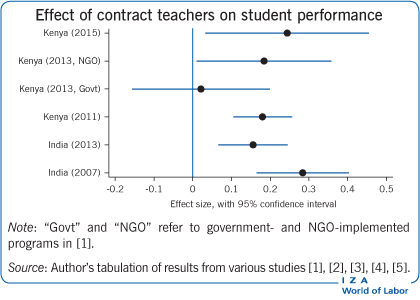Elevator pitch
Teachers are perhaps the most important determinant of education quality. But what makes a teacher effective? Developing countries expend substantial resources on certifying teachers and retaining those who become certified; moreover, policymakers and aid donors prioritize increasing the prevalence of certified teachers. Yet there is little evidence that certification improves student outcomes. In fact, augmenting a school's teaching corps with contract teachers hired outside the civil service and without formal qualifications may be more effective in boosting student performance.
Key findings
Pros
Improving teacher quality is likely to have large positive effects on student performance in developing countries, given low levels of student learning, school resources, and institutional capacity.
Expanding teacher certification in developing countries would raise teacher qualifications from a low base, particularly in the poorest regions.
Strong support for expanding the certified teaching corps exists among both policymakers and aid donors.
There is great potential to strengthen the link between the content of certification programs and improvements in teacher quality.
Cons
In its present form, teacher certification is not associated with better student performance.
Augmenting a school's teaching corps with contract teachers, who are often uncertified, can improve student performance.
Certified teacher salaries are several times those of uncertified teachers in many countries.
Given the lack of association between certification and student learning, the opportunity cost of certification programs appears high.
